In Baton Rouge you’ll find overall living costs about 7–8% below the U.S. average, with housing driving most savings; one‑bedroom rents run near $1,100 and typical renter housing costs about $1,855/month. Expect utilities roughly 30% cheaper, groceries a few percent lower, and transportation and healthcare modestly below national norms. A comfortable single living here targets about $52K/year; family budgets rise to ~$84K–$97K depending on kids. Keep going to see detailed monthly line items.
Cost of Living Overview for Baton Rouge
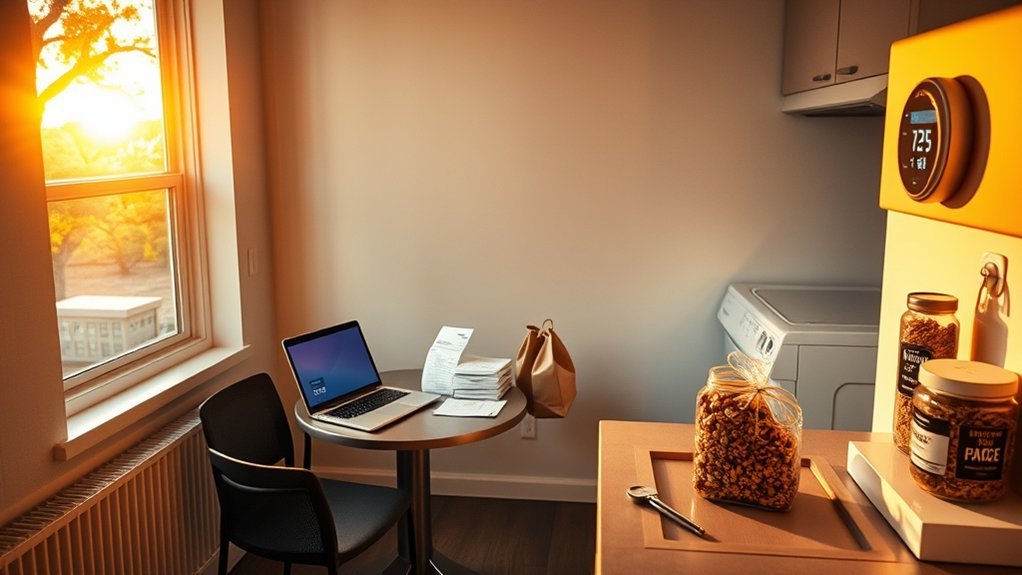
Although Baton Rouge sits below the national average, you’ll find the city offers measurable savings: overall living costs run about 7–8% under the U.S. norm, with renter and homeowner indexes roughly 8–9% lower.
You’ll notice a lower cost of living shows up across housing, groceries, utilities, transportation and healthcare. Average monthly rent hovers near $1,372 citywide (one-bedrooms ≈ $1,106; two-bedrooms ≈ $1,260; regional apartment average ≈ $1,271), yet typical renter households report total monthly expenses near $4,377 and homeowners about $7,697.
Groceries run 2–8% cheaper and utilities are about 30% lower (energy roughly $108–$110/month; phone $188–$192/month). Gas and doctor visits also trend below national figures, while clothing, repairs and entertainment sit a few percent higher. Additionally, building a house can often be more expensive than buying an existing home, which is an important consideration for potential homeowners.
Use these data points to set realistic expectations: housing is the biggest variable, but overall budget planning should reflect Baton Rouge’s measurable savings compared with national averages.
Monthly Budget Breakdown for a Single Renter
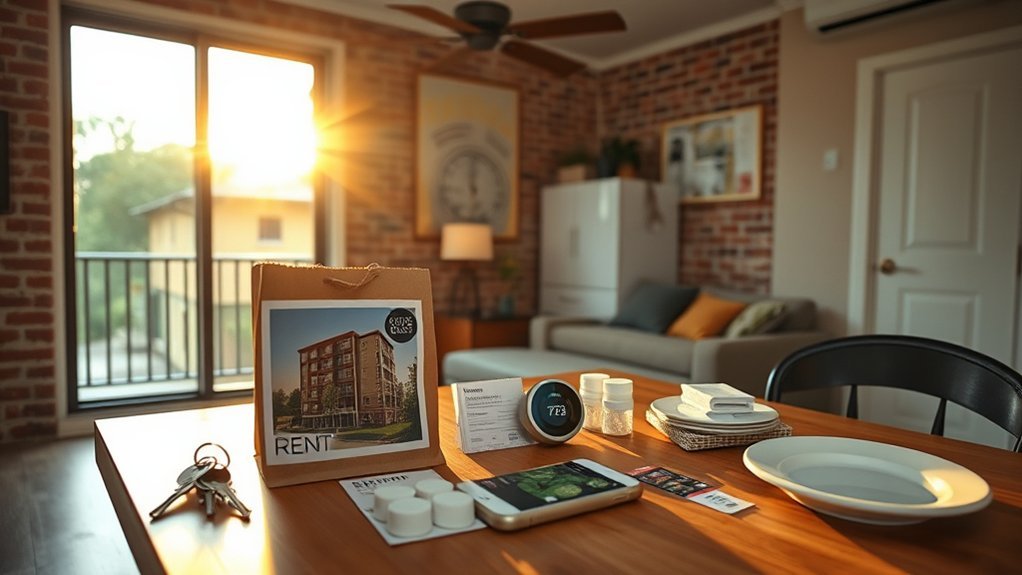
If you’re budgeting as a single renter in Baton Rouge, plan for about $4,377 per month with housing as the largest line item—roughly $1,855 on average (about 11.5% below the U.S. renter housing component).
Your rent in Baton Rouge will be the anchor of this budget; the remaining $2,522 covers essentials and discretionary spending.
Break that down: groceries ~$676 (2–3% below national average; ground beef ≈ $7.13, steak ≈ $15.51), utilities ~$268 (energy ≈ $107.87, roughly 30% cheaper than U.S. average), transportation ~$349 (lower gas ≈ $2.98/gal and maintenance), and goods & services about $1,099 (clothing, entertainment, personal care; ~3–4% above national).
Consider that understanding the initial startup costs of a group home in your area can impact your overall financial planning and budgeting strategies.
Use these line items to test scenarios: if rent rises or you aim to save toward household income goals, adjust groceries or discretionary spending first.
Track actuals monthly to align your budget with local prices and your target household income.
What Families Can Expect to Pay Monthly
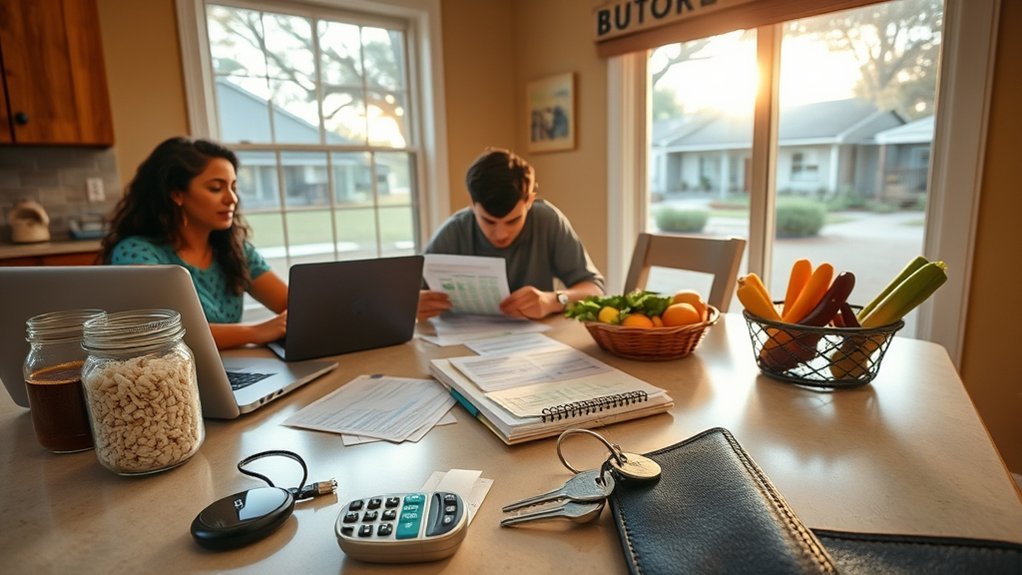
Having looked at a single renter’s monthly needs, let’s look at what families should plan for in Baton Rouge. Expect a married couple with children under 6 to average about $7,002/month; housing runs near $1,841, roughly 15.7% below the U.S. housing component. If your children are 6–17, typical monthly costs rise to about $8,068, with housing near $2,020 (≈16.1% below U.S. levels).
Groceries are a notable recurring cost: plan about $1,313/month for young kids and $1,533 for older children, both about 2–3% below the national grocery average. Utilities for family households usually fall between $557 and $608 monthly, around 30% below U.S. averages thanks to lower energy costs. Additionally, regular vehicle maintenance, such as air conditioning hose replacement, can help prevent unexpected expenses in your transportation budget.
Transportation and goods & services add substantially—transport roughly $707–$814, goods & services about $2,264–$2,728—with transportation about 10% below national norms. These figures help you forecast family budgets while keeping an eye on Baton trends and relative home prices.
Rent and Housing Market: Apartments and Home Prices
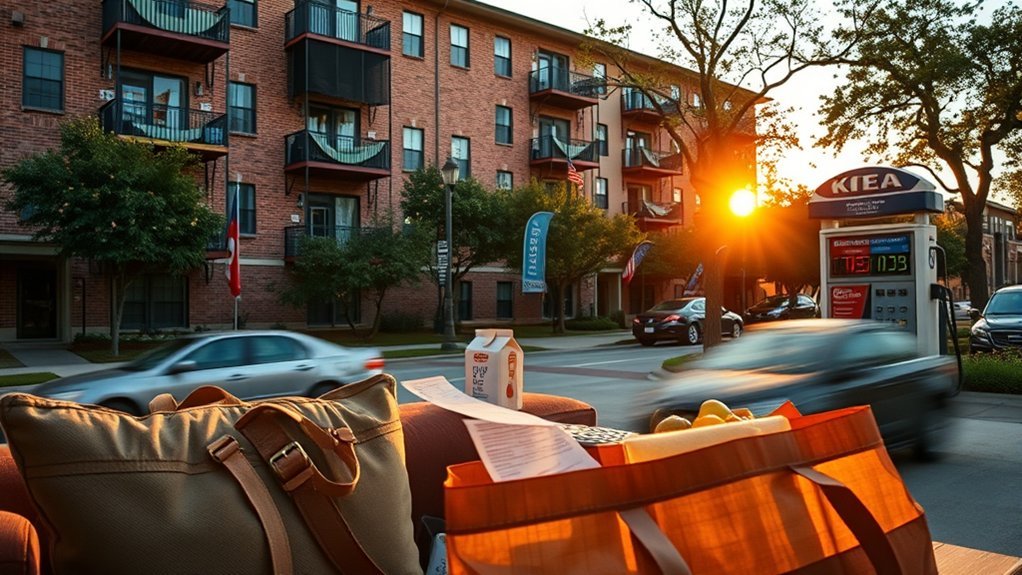
You’ll find average one‑bedroom rents around $1,106 and two‑bed units near $1,260, with overall apartment averages about $1,372 monthly — conspicuously below national levels by roughly 15–36.8%.
Typical listed house prices sit near $422,550 (though some local reports put median sales closer to $192,264), and home values are about 18–19% under the U.S. average.
We’ll compare the yearly housing cost (about $22,260) and recommended single‑earner target (~$52,524) to help you weigh renting versus buying here. Additionally, it’s essential to consider operational expenses when budgeting for housing in any area, as they can significantly impact your overall cost of living.
Average Apartment Rents
Several data sources show average apartment rents in Baton Rouge fall below national levels, typically ranging from about $1,030 to $1,372 per month depending on dataset and neighborhood.
You’ll find an average apartment rent near $1,372 monthly (one-bedroom ~$1,106; two-bedroom ~$1,260) while some reports list $1,271 or citywide averages as low as $1,030.
Renters’ typical housing component averages about $1,855/month versus homeowner housing around $1,896, both under U.S. comparisons.
When budgeting, factor neighborhood variation, unit size, and current interest rates if you’re weighing renting versus buying.
Aim to keep housing costs at or below 30% of your income to maintain affordability, and compare listings across sources to get realistic local expectations.
Typical Home Prices
After looking at typical rents, it’s helpful to compare what buying looks like in Baton Rouge so you can weigh renting versus owning. You’ll find average rent for a 1‑bed around $1,106 and 2‑beds near $1,260, with citywide apartment average cost about $1,372/month; that frames housing choices.
Typical home listings span roughly $413,124–$424,403, though some local measures show a city median sale near $192,264 and broader-area listings near $422,550. Estimated homeowner monthly housing costs (mortgage plus related items) run about $1,896/month, about 18–19% below national homeowner components. Cost-of-living datasets place the renter housing component near $1,855/month.
A commonly cited comfortable single-adult salary to cover housing is about $52,000–$52,524/year.
Renting vs. Buying
When you’re weighing renting versus buying in Baton Rouge, compare monthly cash flow and upfront costs: average apartment rent runs about $1,372/month (one-bed ~$1,106; two-bed ~$1,260) while typical homeowner costs average roughly $1,896/month based on median listings near $422–424K, with some local sale medians closer to $192K; mortgage rates (for example around 6.9%) and down payment size will materially change that owner monthly payment.
You’ll pay lower upfront for rent and avoid maintenance, but homeowner housing builds equity and can be cheaper long term if prices and rates cooperate. Use your income, job stability, and 30%-of-gross rule to guide the choice.
- Compare total monthly cash flow (rent vs. mortgage, taxes, insurance)
- Factor down payment and closing costs
- Estimate repairs and maintenance for homeowner housing
- Consider resale market and interest-rate risk
Utilities: Energy, Water, Phone, and Internet Costs
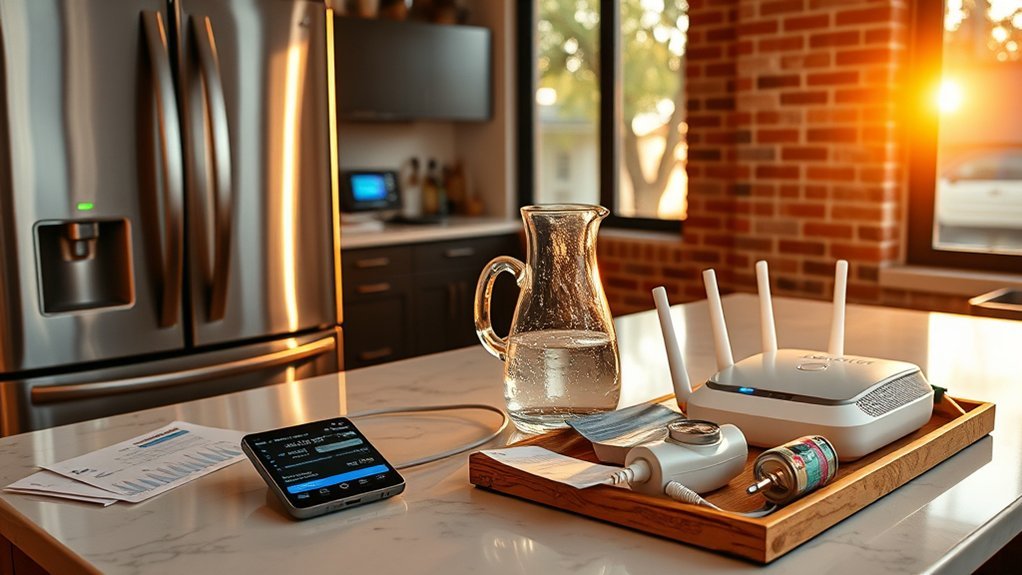
You’ll typically see monthly energy bills around $108.90 (about 30% below the U.S. average), with local reports near $107–$110.
Phone service runs about $188–$192 per month, and bundled renter utilities average roughly $268/month versus homeowner utilities near $579.
These figures are updated quarterly using C2ER data and recent local energy and telecom estimates. Additionally, it’s important to consider potential additional costs related to utilities that may arise, such as maintenance or installation fees.
Monthly Energy and Water
How much will utilities add to your monthly budget in Baton Rouge? You’ll find energy and water costs make housing more affordable here: average electricity runs about $108.90/month, roughly 30% below the U.S. energy Cost average, and aligns closely with nearby cities like New Orleans. For practical Living planning, include water with energy to estimate your baseline utilities.
- Electricity: ~$109/month, lowers overall housing Cost versus national average.
- Water: typically bundled into municipal bills; expect modest additional charges depending on usage.
- Combined renter utilities: average around $268/month (energy, water, phone, internet bundled).
- Homeowner utilities: average about $579/month, reflecting larger homes and more systems to run.
These figures give a data-driven baseline for monthly budgeting.
Phone and Internet
Don’t overlook phone and internet when you’re mapping out monthly utilities—typical household phone service in Baton Rouge runs about $188–$192 per month, and internet costs are bundled into the broader utilities estimates used here.
You’ll find that Internet service and phone together are reflected in the city’s utilities figure, which sits roughly 30% below the U.S. average. That lower utilities burden helps explain why Baton Rouge’s overall cost of living is about 7% below the national norm.
When you budget, treat energy (~$109–$110/month) as separate but remember combined utilities (energy, water, Internet service, phone) remain especially cheaper than many cities. Still compare provider plans and factor seasonal changes in energy use.
Groceries and Food Prices Compared to the U.S
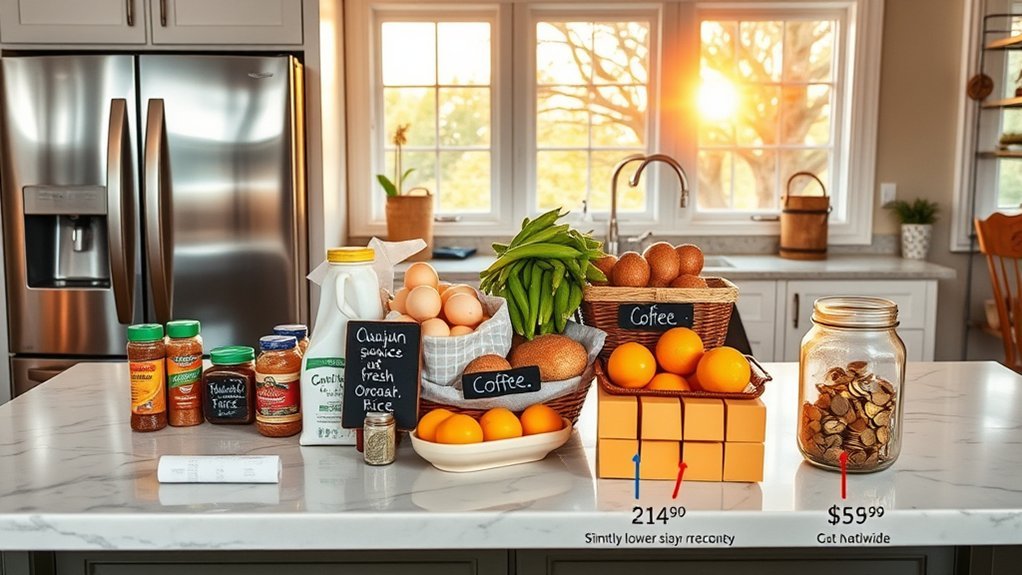
In Baton Rouge you’ll generally pay a bit less for groceries than the U.S. average — roughly 2–3% cheaper — with staples like a gallon of milk at about $4.59–$4.62 and a loaf of bread near $3.91. You’ll notice modest savings on everyday items, though food isn’t the biggest driver of local affordability compared with housing.
Use product prices to plan weekly budgets and expect most items to sit close to national averages.
Plan weekly grocery budgets with product prices—most items will hover near national averages.
- Milk: ~$4.59–$4.62 per gallon — slightly less than the U.S. average.
- Bread: ~$3.91 per loaf — small savings on basics.
- Proteins: ground beef ~$7.13/lb, steak ~$15.51/lb — near national levels.
- Prepared food: pizza ~$10.92 (about 12% cheaper), restaurant entrées vary.
Focus on less-expensive stores, seasonal produce, and sale cycles to stretch your grocery dollars. Overall, groceries offer a small but reliable reduction in living costs compared to the national market, useful when you’re mapping monthly expenses. Additionally, being mindful of school computer repair costs can help allocate funds more efficiently throughout the year.
Healthcare Expenses: Visits, Prescriptions, and Insurance Considerations

After you’ve mapped grocery and dining costs, factor healthcare into your monthly budget: typical doctor visits run about $136 and optometrist appointments roughly $104, both roughly 9–13% below some U.S. city averages, while dental visits average around $108 and OTC pain relievers cost about $10.89.
You should budget knowing overall healthcare expenses in Baton Rouge tend to be 9–11% below national averages, but variability by provider and service is real.
Account for routine copays, occasional outpatient visits, prescriptions, and any specialist care you might need.
If you require regular meds or ongoing specialist treatment, verify local provider fees and drug prices before committing.
Review plan formularies, in‑network provider lists, and expected out‑of‑pocket maximums so insurance considerations match your health needs. Additionally, consider how pardon lawyer costs may impact your overall financial planning if you require legal assistance related to healthcare or other issues.
For conservative monthly planning, set aside extra for unexpected referrals or higher‑cost procedures, and compare multiple clinics and pharmacies to reduce your net spending without compromising care.
Transportation Costs: Gas, Transit, and Commuting Expenses
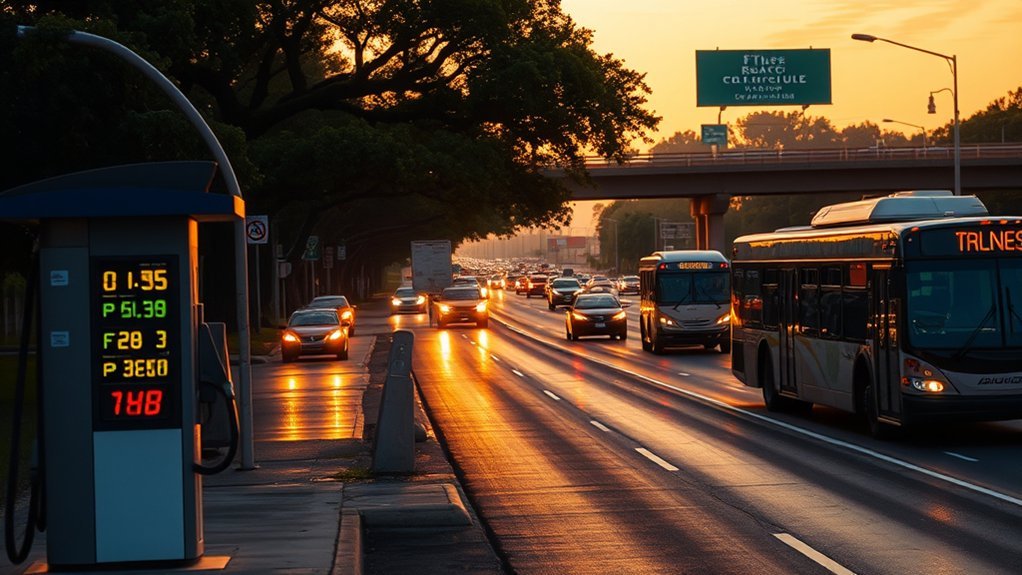
Expect transportation to be noticeably cheaper in Baton Rouge than in many U.S. cities: gas runs about $2.98 per gallon (≈8% below the national average), routine services like a tire balance cost roughly $51.79 (about 16% less), and overall transportation expenses are around 10.4% below U.S. averages.
You’ll find gasoline averages about $2.98 per gallon in Baton Rouge, roughly 8% below the U.S. average, which helps lower monthly fuel costs for drivers.
Typical monthly spending is about $349 for renters and $736 for homeowners, covering commuting, fuel, and vehicle upkeep.
When you budget, factor in extra fuel from traffic and compare public transit or rideshare options since car ownership remains common.
- Expect lower per-gallon fuel costs and cheaper basic services.
- Budget $349–$736 monthly depending on housing status.
- Factor added fuel use from congestion into commuting expenses.
- Compare transit passes or rideshares against driving costs before deciding.
Additionally, consider potential maintenance expenses such as exhaust leak repairs, which can vary widely based on vehicle condition and location.
Goods & Services: Clothing, Entertainment, and Personal Care
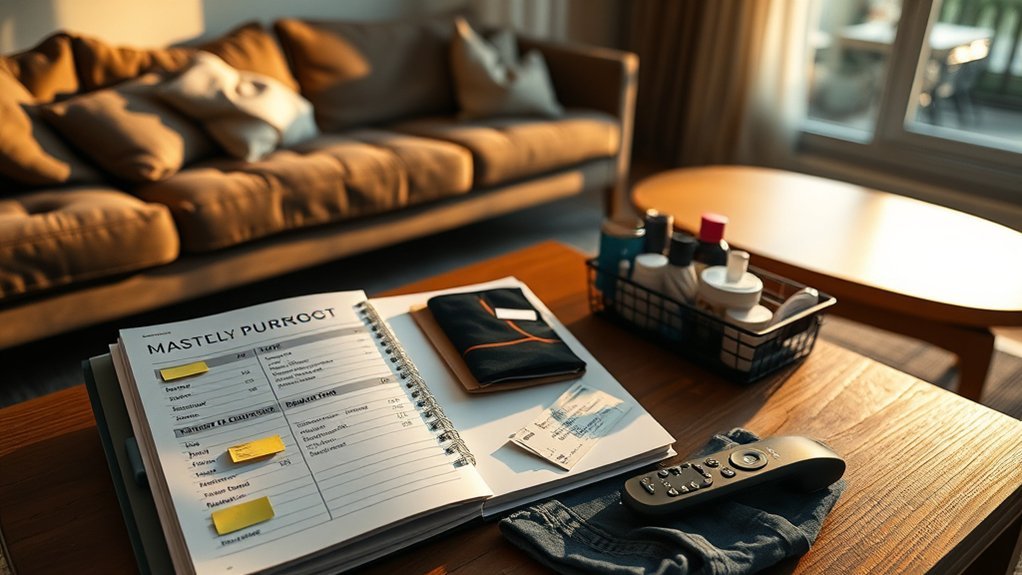
Although overall goods and services in Baton Rouge run about 3.9%–4% higher than the U.S. average, you’ll see a mixed picture: clothing and some household services cost noticeably more while entertainment and basic personal care can be cheaper. You’ll pay roughly $40.16 for a men’s shirt and about $48.7 for women’s slacks (around 33% above the national average). Expect dryer or washer repairs near $126.81. On the flip side, entertainment like a movie ticket is about $10.90 (≈13% below the U.S. average) and yoga classes average $21.33. Additionally, retainers and their replacement costs can vary widely based on individual orthodontic needs.
| Category | Typical Price | Note |
|---|---|---|
| Men’s shirt | $40.16 | Standard retail |
| Women’s slacks | $48.62–48.82 | ~33% above average |
| Movie ticket | $10.83–10.95 | ~13% cheaper |
Personal care runs moderate: haircuts ~$25, beauty salon ~$51.67, dry cleaning ~$13.86. Use these figures to fine-tune monthly discretionary budgets.
Salary Targets and How Much You Need to Live Comfortably
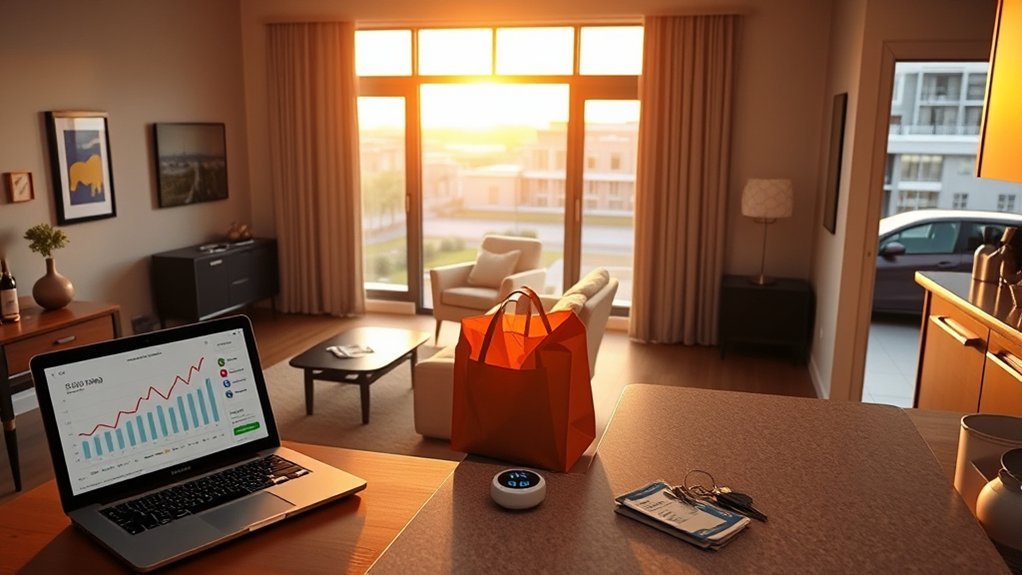
To live comfortably in Baton Rouge, aim for a single-adult salary around $52,524 a year (roughly $4,377/month) so housing stays near the recommended $22,260/year.
If you’re part of a family, plan for about $7,002/month for a couple with young kids or $8,068/month for older children, with typical local housing between $1,841–$2,020/month.
Homeowners generally need about $7,697/month, and targeting a monthly income of $4,347–$4,377 keeps housing under 30% of earnings. Additionally, considering long-term savings from not paying for gym memberships can help in budgeting for a comfortable lifestyle.
Comfortable Single-Adult Salary
If you want a comfortable single-adult lifestyle in Baton Rouge, plan on about $52,524 a year (roughly $4,377/month) — a figure that covers housing near $22,260/year and leaves room for typical local expenses. With a comfortable single-adult salary like this, Living in Baton Rouge gives you lower-than-average costs: housing often runs near $1,030–$1,271 for many units, utilities are about 30% cheaper, and overall costs sit 7–8% below the U.S. average.
On this salary you can follow the 30% housing rule (cap around $1,313/month) and still cover groceries, transport, and modest discretionary spending.
- Housing: ~$1,855/month typical component
- Groceries: ~$676/month
- Utilities: ~$268/month
- Transportation: ~$349/month
Family Income Benchmarks
When you map out family income targets for Baton Rouge, aim for roughly $84,000/year for a married couple with young kids and about $97,000/year for families with older children — figures that reflect monthly needs of roughly $7,002 and $8,068 respectively and include housing (≈ $1,840–$2,020/month) and higher grocery bills ($1,313–$1,533/month).
You should treat these as practical benchmarks: married couples with young children will need income needed to cover childcare, transportation, healthcare, and modest savings.
Families with older kids need more for activities, education, and larger grocery bills.
Compare these targets to the local median household income (~$49,944) to see potential shortfalls.
Adjust plans downward slightly for Baton Rouge’s 7–8% below‑national cost and lower rents when budgeting.
Frequently Asked Questions
What Is the Average Cost of Living in Baton Rouge?
You’ll typically spend about $4,377 monthly as a renter in Baton Rouge; transportation expenses average $349, groceries show modest grocery inflation (≈2–3% below U.S.), and overall living costs run roughly 7–8% lower.
How Much Do You Need to Make to Live Comfortably in Baton Rouge?
You’ll need about $52,500 yearly to live comfortably in Baton Rouge; that assumes local job market realities, typical commute costs, and covers rent, groceries, utilities, transportation, and extras based on regional expense data.
How Much Should Monthly Rent Cost?
Aim for rent around $1,106 monthly (one-bedroom average); you’ll compare neighborhoods, spot bargains, and use lease negotiation to lower costs. Be practical, data-driven, and prioritize areas where rent stays under 30% of income.
What Is the Average Cost of Living in Louisiana for a Single Person?
You’ll need about $4,377/month renting (≈$52,524/year) or $7,697/month owning; remote work can cut commuting costs, but watch food insecurity risks despite lower groceries and utilities in Louisiana.
Conclusion
Living in Baton Rouge won’t bankrupt you — but it’s not pocket change either. With rents, utilities, healthcare and transport costs outlined, you can budget realistically: expect modest apartments under $1,000, family budgets markedly higher, and essentials adding several hundred dollars monthly. Aim for a salary that covers housing, bills, savings and surprises. Plan, compare prices, and adjust choices — do that and you’ll thrive here, not just survive.


